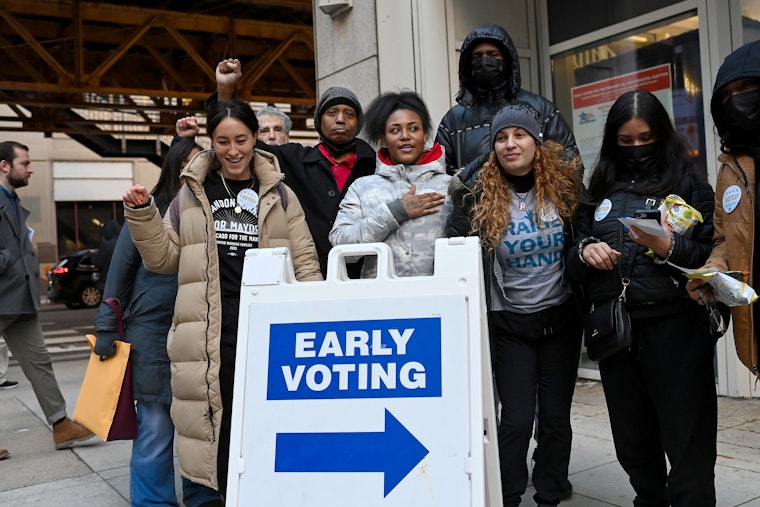Bolstering Women and Youth, Linchpins of Democracy
By Alex Soros

The handwringing is well underway. America’s divisive politics are turning voters off in droves, some analysts say; turnout will surely suffer. The surge in civic engagement by women spurred by the Supreme Court’s ruling overturning Roe v. Wade—which rolled back constitutional protections for abortion that had been in place for nearly a half century—can’t last, they say. Young people, who rallied to the polls in 2020, are losing interest, and are unlikely to participate in meaningful numbers when Election 2024 comes around.
And yet, there is ample evidence to the contrary, all across the country. Earlier this month, the voters of Ohio overwhelmingly approved an amendment to the state Constitution protecting reproductive rights—the seventh state to pass protections for abortion rights since the Court’s ruling in Dobbs v. Jackson Women’s Health Organization. Women increased their representation in the Virginia and Mississippi legislatures, according to the Center for American Women and Politics at Rutgers University. Philadelphia elected Cherelle Parker as the city’s first woman—and first Black woman—mayor. Lily Wu won election as the first Asian-American woman to serve as mayor of Wichita, Kansas. And U.S. Representative Sheila Jackson Lee entered a runoff to be decided in December; if she wins, she will become Houston’s first Black woman mayor.
Young people, too, are defying the gloomy forecasts. Early nationwide polling for the 2024 presidential election may show waning enthusiasm, but on the ground, youth are showing up at the polls. Young people turned out in force this spring for a hotly contested Wisconsin state Supreme Court election. And in Pennsylvania, a recent state Supreme Court race marked a 110 percent increase among young voters over the last state Supreme Court contest in 2021, powered by surges in precincts that are home to the state’s major colleges and universities.
These results may be an important harbinger as we head toward the 2024 elections in the U.S. The continued—and increased—engagement of women and young people will be essential in protecting and advancing our democracy against the forces of authoritarianism massing at our door.
The way we choose our leadership—through the hallmark peaceful transfer of power—was tested like never before following the 2020 elections. A diverse electorate, propelled to action by the failures of the Trump administration, prevailed—and turned out again in 2022, thwarting the tides that typically punish the party in power in midterm elections. But ongoing efforts to restrict voting rights and to erect barriers to access across the country, make doing one’s civic duty next year more important than ever.
The Open Society Foundations, the philanthropic organization I chair, is doing its part. This week we are announcing a $50 million investment to boost nonpartisan civic engagement among women and young people—two diverse and historically under-funded communities.
The importance of participation by these two demographic groups cannot be overstated. The majority of America is female. When Donald Trump was elected president in 2016, women launched a global protest, calling out misogynistic policies that posed a fundamental threat to the rights of more than half the U.S. population. Timed to the date of Trump’s inauguration in January 2021, the Women’s March was at the time believed to be the largest protest in U.S. history.
The fears that drove so many women into the streets—including of losing hard-won rights like access to abortion—were realized in 2022, when the Supreme Court overturned Roe v. Wade and opened the door to a wave of state-level measures seeking to ban or severely restrict reproductive rights. The recent selection of House Speaker of Louisiana Republican Representative Mike Johnson, an avowed champion of a national abortion ban, only heightened the threat of a further state intrusion into women’s bodily autonomy.
Rage over the Court’s ruling in Dobbs v. Jackson Women’s Health Organization has been a powerful motivator at the polls. Ohio was the seventh state to put abortion rights on the ballot since the Dobbs decision. The pro-choice position has won each time. Women—young and old, and of every race—have propelled forward efforts to protect abortion access in these states. But that hasn’t stopped the march of anti-reproductive freedom forces through state legislatures; 21 states now have laws more restrictive than the Roe standard, and many other such measures are being contested in court. And amid America’s flirtation with a more authoritarian ideology, many other vital issues—from restrictions on hugely popular contraception and pay equity, to economic inequality and workplace discrimination—hang in the balance.
Civic engagement by young people is equally key to significantly increasing participation levels in America’s democratic processes. The U.S. has historically had a serious problem of youth apathy when it comes to politics, with one of the lowest rates of youth voter turnout in the world. But anger and organizing over the Parkland school shooting and government inaction on the growing climate crisis helped spur a meaningful bump in turnout among voters age 18 to 29 in 2018. And innovations to make voting easier amid the COVID-19 pandemic helped power a record number of youth voters in 2020, when fully half that age demographic cast ballots in the presidential election. Additionally, there was an increase in voter registration rates in the days after George Floyd’s murder and the protests that followed.
In the early stages of the Trump administration, philanthropic support for organizations seeking to protect and defend progressive policy wins and to counter democratic suppression efforts surged. But groups dedicated to the civic engagement of women and young people did not see similar increases in levels of support.
The investments Open Society announced this week seek to start to address that imbalance, but we need other funders to join us in helping to resource these crucial constituencies—whose engagement is critical for American democracy.

Alex Soros is chair of the Board of Directors.

